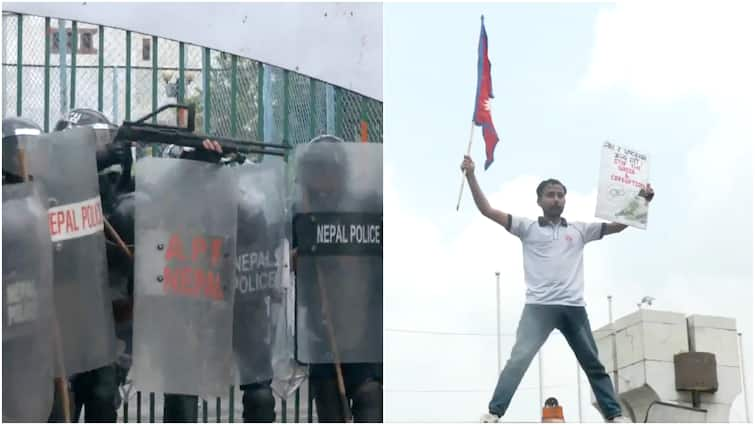Nepal Protests: At least nine people have been killed and over 40 injured on Monday as violent demonstrations rocked Kathmandu and other parts of Nepal following the government’s ban on 26 social media platforms, including Facebook, Instagram, WhatsApp, YouTube and Snapchat. According to Nepal Police, the protests spiralled out of control after thousands of young demonstrators, including students, marched towards the Parliament in Baneshwor on Monday, accusing the government of corruption and curbing freedom of expression. The agitiation was dubbed a ‘Gen Z’ protest owing to high participation from youth.
According to local media reports, the agitation, which began as a peaceful march, descended into violence when protesters broke through police barricades and attempted to enter restricted zones near the federal Parliament. Security forces retaliated with baton charges, water cannons, rubber bullets and tear gas.
Local media reported that initially one person was killed in the clashes. Police confirmed that nine others had died in violence across the capital, news agency ANI reported.
Several journalists, including Dipendra Dhungana of Naya Patrika, Umesh Karki of Nepal Press and Shyam Shrestha of Kantipur Television, were hit by rubber bullets and are undergoing treatment at Civil Hospital, The Himalayan Times reported.
Videos of the violent clashes between police and agitators surfaced, showing tense scenes. Protesters were seen vandalising the Parliament gate as the protest turned violent in the capital city.
Police covered with shields were seen firing rubber bullets at the protestors.
A protester told ANI, “A while ago, the police fired bullets which did not hit me but hit a friend of mine standing behind me. He was shot in the hand. The firing is still going on and we can hear gunfire from inside the parliament as well. My friend, who was standing on the road, was shot in the head. The police are firing indiscriminately, aiming above the knees. Are they allowed to do this?…”
“We were planning to hold a peaceful protest, but as we advanced further, we could see the violence by the police. The police are firing on the people, which is against the essence of peaceful protest. Those who are sitting in power cannot impose their power on us. Anti-corruption protests are being suppressed, which is against the freedom of speech and the right to expression. The Police have been firing at protestors,” another protestor remarked.
Nepal: Protests Spread Beyond Kathmandu, Curfew Imposed
In Damak, demonstrators marched from Damak Chowk to the municipal office, burning an effigy of Nepal Prime Minister KP Sharma Oli and attempting to storm the gates. Police opened fire with rubber bullets, critically injuring one protester, according to The Himalayan Times. Several motorcycles were set ablaze, and protesters hurled teargas shells back at security personnel who had retreated into defensive positions.
The Kathmandu District Administration extended prohibitory orders under Section 6 of the Local Administration Act, banning movement, protests and gatherings from 12:30 pm to 10 pm in Baneshwor and surrounding high-security zones, including the President’s residence at Shital Niwas, the Vice-President’s residence in Lainchaur, Singha Durbar, and the Prime Minister’s official residence in Baluwatar, The Kathmandu Post reported. Chief District Officer Chhabilal Rijal issued the curfew notice, warning that no assemblies would be tolerated in these areas.
Nepal: Public Outcry Over Social Media Ban, Celebrity Support
The ban, which came into effect past midnight on September 4, followed a Cabinet decision last month and an August 17 Supreme Court order requiring social media platforms to register locally and pay taxes. However, critics note that the law cited — The Operation, Use, and Regulation of Social Media in Nepal Bill — has yet to be passed by Parliament.
While platforms such as Viber, TikTok, Wetalk and Nimbuzz are registered in Nepal, popular apps like Facebook, Instagram and WhatsApp remain unregistered, prompting the government to block access.
The move has drawn widespread anger, particularly among the youth, who accuse the authorities of silencing dissent while ignoring deep-rooted corruption. Nepalese actor Hari Bansha Acharya voiced support on Facebook, saying: “Today’s youth do more than just think—they ask questions. Why did this road collapse? Who is accountable? This is not a voice against the system but against those who misuse it.”
Singer and actor Prakash Saput also backed the protesters, reportedly sending NRs 25,000 each to two brothers participating in the demonstrations, advising them to stay hydrated and use the money to support fellow demonstrators, The Kathmandu Post reported.



